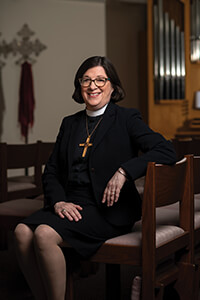True and lasting joy
December 13, 2024
Now in that same region there were shepherds living in the fields, keeping watch over their flock by night. Then an angel of the Lord stood before them, and the glory of the Lord shone around them, and they were terrified (Luke 2:8-9).
Night. A liminal time. A time when God sends messages and messengers to mortals. A time when nocturnal predators are active. A time when, while the world is asleep, greater vigilance is required of those who keep watch.
And here are these shepherds. Except for Mary and Joseph, they were the first to learn of Jesus’ birth. Shepherds figure prominently in Scripture as metaphors for faithful leaders, good kings, compassionate and brave. David was a shepherd boy called into God’s service. Jesus declared himself to be the Good Shepherd. But in actuality, shepherding was hard and dangerous work, and shepherds were not considered to be among the elite in society. Shepherds were an out-of-bounds people, living outside of the city, and a little suspect. Why would the news of the birth of the king be announced to them?
In the eucharist, Christ invades us with God’s joy. We are intimately connected to the source of joy and grace in this gift.
What about Bethlehem? The prophet Micah called Bethlehem “one of the little clans of Judah” (Micah 5:2). Even today, Bethlehem would not be counted among the world’s great cities. In 1950, Christians made up 86% of its population. Now they are under 10%. Its economy is based on tourism, which has been decimated by the current conflict. Bethlehem is in the occupied West Bank, in a war zone.
To these terrified shepherds, literally sitting in the dark outside of Bethlehem, an obscure town in an occupied province of the Roman Empire, God chose to reveal the birth of the Messiah. What on earth was God thinking? Why not in Jerusalem? Why not in Herod’s palace? Why not in Rome, where the emperor claimed to be soter, “savior.”
How does the angels’ announcement of the birth of the Messiah sound to people living in obscure places far from the centers of power in indescribably difficult circumstances today? To those living in Gaza and Ukraine, in Sudan, in the homes of immigrants in this country who fear deportation? To starving children here and across the globe? How dare we wish them “Merry Christmas”?
“But the angel said to them, ‘Do not be afraid, for see, I am bringing you good news of great joy for all the people: to you is born this day in the city of David a Savior, who is the Messiah, the Lord’” (Luke 2:10-11). Joy. Not happiness that is transient and human-made, but joy, given by God, that is deep and strong and unshakable.
Joy is a sign of the reign of God. The root word for “joy” in Greek is the same as that for “grace.” “Gift” also comes from the same root as does “thanks.” All of this points to the nature of true joy. It is gift. It is grace. It is thanksgiving. Our word “eucharist,” a name for Holy Communion, ties this all together in the sacrament where Jesus’ body is broken for us and Jesus’ blood is poured out for us. In the eucharist, Christ invades us with God’s joy. We are intimately connected to the source of joy and grace in this gift.
Perhaps that is why, in the middle of the night, to terrified shepherds outside of a small town, God chose to send the angels to announce the birth of Jesus. No distraction. No interference. Just the simple, deep, profound gift of true and lasting joy. A joy that comes from God, from the essence of God, depending only on God, that no earthly power can take away.


